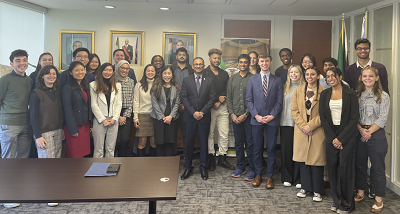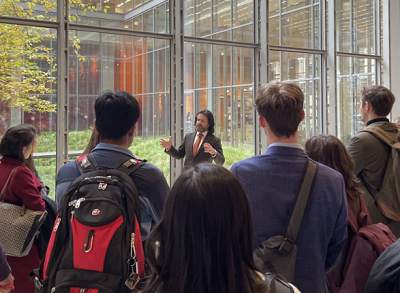Perry World House Perry World House Student Fellows Engage with Global Community on Annual NYC Trip
Basic Page Sidebar Menu Perry World House
December 8, 2023
By
Perry World House
On Friday, November 17, Perry World House’s World House Student Fellows (WHSF) Program led students on its annual Fall semester trip to New York City. Each year, 25-30 fellows are competitively selected from Penn’s four schools (the College of Arts & Sciences, Engineering, Nursing, and Wharton) and brought together for a full year of extracurricular academics. The students’ range of talents and interests lends a natural diversity to the group, yet all the student fellows share two important traits: a keen interest in global affairs and a commitment to tackling a pressing policy challenge for a full academic year. The World House Students Fellows Program is led by Amy Gadsden, Associate Vice Provost for Global Initiatives and Interim Executive Director for Perry World House, Melissa Lee, Klein Family Presidential Assistant Professor of Political Science, and is administered by John Macri, Student Programs Coordinator.
The WHSF Program enables undergraduate student fellows to meet as a cohort through weekly seminars with researchers or policy practitioners to discuss different policy areas at Penn. The New York trip however—as well as a similar trip to Washington, DC in the spring and to Geneva over spring break—allows students to take a deeper dive into different perspectives on policy, exploring how global issues impact different professions. This year, students met with leaders at Permanent Mission from Jamaica to the United Nations (UN), TPG Angelo Gordon, and the New York Times.
“The New York trip provided an unparalleled opportunity for students to learn about the practice of global policymaking, the influence of international affairs on private business, and the role of the journalism in making world events visible and accessible. The meetings during the trip also exposed students to the exciting diversity of career paths in global policy,” said Professor Lee. “We are very thankful to our meeting partners for reinforcing the work and discussions that take place in our weekly seminars. Their time and expertise add incredible value to the students’ learning experience, which the students affirmed in their reflections about the trip.”
“The World House Student Fellows program is a home on Penn’s campus for undergraduates who want to go beyond the classroom in their study of global policy. In meetings with government, industry and media leaders, students come to appreciate how different professional sectors both shape and are shaped by the events going on in our world every day," explained Dr. Gadsden.
The fellows first met with H.E. Brian Wallace, Permanent Representative of Jamaica to the UN at the Consulate General of Jamaica. Ambassador Wallace was eager to meet with the students and led a lively conversation about his career and work as a representative of Jamaica and the Caribbean at large in the UN.  The ambassador spoke about his commitment to serving his country and the greater good, evident in his legal career spanning more than three decades, which included experience in Jamaica’s Attorney General’s Chambers, private practice, and persecuting offenders of the Rwandan genocide at the International Criminal Tribunal for Rwanda. Ambassador Wallace explained to students that while some may be skeptical about the role that small island nations have to play in a multilateral organization, his experiences have shown how their voices are critical in shaping global conscience on issues such as human rights and climate change. Ambassador Wallace also spoke at length about the crucial role of activism on college campuses: the new minds of college students, who the Ambassador described as freethinking and uncontrolled, need to be the vanguard of both addressing new policy challenges and providing moral clarity to a rapidly changing world.
The ambassador spoke about his commitment to serving his country and the greater good, evident in his legal career spanning more than three decades, which included experience in Jamaica’s Attorney General’s Chambers, private practice, and persecuting offenders of the Rwandan genocide at the International Criminal Tribunal for Rwanda. Ambassador Wallace explained to students that while some may be skeptical about the role that small island nations have to play in a multilateral organization, his experiences have shown how their voices are critical in shaping global conscience on issues such as human rights and climate change. Ambassador Wallace also spoke at length about the crucial role of activism on college campuses: the new minds of college students, who the Ambassador described as freethinking and uncontrolled, need to be the vanguard of both addressing new policy challenges and providing moral clarity to a rapidly changing world.
Reflecting on the meeting, WHSF David Adam Kato (C’24) said, “Ambassador Wallace mentioned a number of arguments that I found interesting. First, he discussed the growing need of the United Nations to reform, better reflect its current membership, and present global needs as opposed to the immediate post-WWII context within which the UN was founded. It was also interesting to hear the Ambassador speak about the impact of small states within the multilateral system. He referred to such states as the conscience of the UN system since compared to other countries, they tend to be driven by principles of international law and are less distracted or constrained by special interests.”
David, who is from Rwanda, added that he made an extra visit between the students’ morning and lunch meetings. “I realized the UN Mission from Rwanda was close to our first meeting location and decided to pay them a visit. I was given a warm welcome and encouraged to come again despite the office having their hands full with an ongoing visit with students from another university, and with multiple staff out on errands for the mission.”
After the UN, the student fellows met with TPG Angelo Gordon Co-Managing Partner and Head of Credit Josh Baumgarten (W’98). As a Penn alumnus and a member of the Board of Overseers for Penn’s School of Social Policy and Practice, Josh provided a uniquely Penn perspective on his career and the work of the firm. One theme of discussion was the importance of a people-first approach combined with direct, personal knowledge in investment strategies, leadership, and office culture.
Given the firm’s global reach, Baumgarten also discussed dealing with risk in an international context, and how being physically close to investments and projects could ensure their success. The example brought up around this idea was a hypothetical investment in an infrastructure project. If you are not in the area to physically see the project’s development, it's difficult to ensure that the project is being completed, and that it is serving the local community properly.
About this visit, Sofia Zarif (W’24) said “Josh Baumgarten of TPG Angelo Gordon provided us with insights into how private lenders think about lending and/or investing in developing countries. As a finance major and someone who calls a developing country home, my biggest takeaway from our meeting was that transparency is key for investors, especially when investing in developing countries. Investors want to know whether they should expect stability or volatility in the country to evaluate the risks inherent in finance.” Lindsay Park (E’25) said “Our meeting with Josh Baumgarten was one of the most powerful alumni interactions I've had. I enjoy connecting with Penn graduates, and this was the first time it wasn't on campus, but in his office space. It was interesting to hear about his experiences managing a larger firm and the scaling that comes with a global acquisition.”
Finally, students were hosted at the New York Times by reporter, editor, and Perry World House Visiting Fellow Clay Risen. Clay facilitated discussions between  the students and two of his colleagues at the Times: Vanessa Mobley, opinion editor, and Neil MacFarquhar, national correspondent. Vanessa’s discussion centered around the role of the Opinion section and how the Times ensures that the pieces published meet the paper’s high standards. While Mobley described news columns as a place people went to figure out what events happened, Opinion occupies a space where people seek how to feel about events. While opinion pieces present different first-person perspectives and arguments, pieces needed to be factually correct, stress-tested, and fair. Stress-testing ensures that the perspective will be be clear about its assumptions and will provide readers with “more light than heat.” Not unique to opinion pieces, Vanessa said she enjoyed writing that looked to the past to say something about the future, and good writing was usually confident writing.
the students and two of his colleagues at the Times: Vanessa Mobley, opinion editor, and Neil MacFarquhar, national correspondent. Vanessa’s discussion centered around the role of the Opinion section and how the Times ensures that the pieces published meet the paper’s high standards. While Mobley described news columns as a place people went to figure out what events happened, Opinion occupies a space where people seek how to feel about events. While opinion pieces present different first-person perspectives and arguments, pieces needed to be factually correct, stress-tested, and fair. Stress-testing ensures that the perspective will be be clear about its assumptions and will provide readers with “more light than heat.” Not unique to opinion pieces, Vanessa said she enjoyed writing that looked to the past to say something about the future, and good writing was usually confident writing.
Florence Onyiuke (C’26/W’26) said “Vanessa illuminated the unique challenge Op-Ed journalists face in balancing personal viewpoints with objective facts. Vanessa playfully highlighted the ‘paradox of opinion,’ influencing not just how news is presented but also how it's interpreted. Her insights have motivated me to view the Op-Ed section as a tool for challenging and expanding my perspectives, not merely reinforcing them.”
MacFarquhar spoke to the students about his experiences as a reporter in Cairo, at the UN, and in Russia, where he was part of a team that won a Pulitzer Prize in 2017. Throughout his different anecdotes, a common theme was respect for people and their cultures. While on assignments, MacFarquhar described the difficulty in getting stories from individuals who didn’t wish to speak with him, perhaps due to a hostility to the West or fear of governmental retaliation, but he found success in situations where he had learned the local language or culture. For Neil, language was the best way to bridge cultural differences because people felt like you took the time to learn something about their culture, and that you would more likely treat their time and stories with respect. This, along with an ability to understand history and an ability to write were the pillars of success in his career, as well as any other career the students wanted to pursue.

